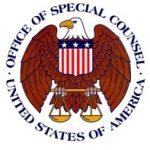After six years leading the U.S. Office of Special Counsel, the terms of Special Counsel Carolyn Lerner and Principal Deputy Special Counsel Mark Cohen expired this week. During their tenure, Lerner and Cohen reinvigorated the agency’s enforcement of the Whistleblower Protection Act and transformed the agency into a powerful force to combat waste, fraud, abuse and other wrongdoing in the federal government.
OSC is a small, independent federal agency whose primary mission is to hold government accountable and safeguard employee rights, primarily by protecting whistleblowers from retaliation. Despite its diminutive size, OSC’s talented and dedicated staff has packed a powerful punch over the last several years when it comes to helping whistleblowers and combatting waste, fraud, abuse and other wrongdoing throughout the federal government.
OSC’s record-setting results for whistleblowers
Despite limited resources, OSC is fulfilling its mission more effectively than ever before. For example, according to OSC, during FY2016, for the second straight year, OSC received over 6,000 new matters, a 25 percent increase over the prior two-year period.
Most of these new cases were whistleblower disclosures and prohibited personnel practice (PPP) complaints, including whistleblower retaliation. Indeed, the number of PPP complaints in FY 2016 (4,111) was the highest level ever, 40 percent more than three years ago, and new whistleblower disclosures were the second highest in agency history.
Not only have federal whistleblowers turned to OSC for protection in unprecedented numbers, OSC has helped them in record levels:
-
OSC gained 276 favorable actions for whistleblowers and other victims of PPPs in 2016;
-
In the last two years, OSC has achieved five times the number of favorable actions in whistleblower retaliation complaints than in any prior two-year period in agency history;
-
OSC also achieved 18 disciplinary actions, upholding accountability and putting the Federal community on notice about unacceptable conduct.
-
OSC is achieving results more efficiently as well: the average cost of resolving a case at OSC has fallen by 37 percent over the last eight years.
 Combatting Waste, Fraud Abuse, and Other Wrongdoing
Combatting Waste, Fraud Abuse, and Other Wrongdoing
During Lerner’s tenure, OSC’s work has been instrumental in rooting out waste, fraud and abuse, and has brought about significant reforms throughout the federal government, including:
-
Curbing systemic abuse of administratively uncontrollable overtime, which resulted in an estimated $100 million in annual cost savings;
-
Exposing and halting improper scheduling and dangerous patient care practices at VA hospitals;
-
Reducing threats to aviation safety caused by confusing and conflicting flight plans; and
-
Improving security protocols at a Navy Yard facility.
To ensure that OSC can effectively serve as a safe channel for whistleblowers to disclose wrongdoing, Lerner vigorously enforced the WPA. For example, in cases where strong evidence of whistleblower retaliation existed early in an investigation, OSC sought stays of unlawful personnel actions from agencies and in some cases, obtained stay orders from the Merit Systems Protection Board (MSPB). And in cases where OSC concluded that a PPP was committed, it sought not only relief for the complainant, but also pursued disciplinary action to hold managers and supervisors accountable for committing PPPs.
Bold, Independent, and Non-Partisan Leadership
To carry out the agency’s critical mission, OSC leadership must be independent and willing to hold fellow Presidential appointees accountable. Lerner and Cohen consistently demonstrated that independence and indeed earned the respect of many Republican Members and Senators. For example, in 2012, Lerner sent a letter to President Obama announcing that Health and Human Services Secretary Kathleen Sebelius violated of the Hatch Act by making extemporaneous political remarks at an event in which she spoke in her official capacity. Lerner has set a high bar for the next Special Counsel of independence and integrity.
Lerner did not shy away from tough fights. Indeed, early in her tenure, she publicly recommended disciplinary action against an Air Force colonel and two civilian supervisors for retaliating against whistleblowers who disclosed misconduct regarding the handling of service members’ remains. The colonel received a letter of reprimand and was denied a position commanding a unit at an Air Force Base and the supervisors agreed to a cut in pay and reassignment to non-supervisory positions. OSC’s swift investigation of retaliation at the Port Mortuary at Dover Air Force Base and the decisive actions that it took to secure relief for the whistleblowers and hold the supervisors accountable sent a strong signal that OSC would provide strong protection to whistleblowers.
Strengthening Legal Protections for Whistleblowers
During Lerner’s tenure, OSC took an active role not just in enforcing the Whistleblower Protection Act (WPA), but also in shaping the law. In particular, Lerner filed amicus curiae briefs before the MSPB, federal courts of appeals, and the Supreme Court in cases raising key issues about the scope of the WPA. For example, Lerner filed an amicus brief with the Supreme Court in the landmark case Dep’t of Homeland Sec. v. MacLean, 135 S. Ct. 913 (2015). In its amicus brief, OSC argued that MacLean’s disclosure about a threat to public safety was protected under the WPA, an argument the Supreme Court ultimately agreed with. OSC’s brief was unusual in that it took a position at odds with the government’s position. Filing the brief signaled to federal workers that OSC was committed to protecting employees who blow the whistle on threats to public health or safety.
Whistleblower advocates’ praise for Special Counsel Lerner and OSC
Since 2011, Lerner and OSC have received hard-earned accolades from the whistleblower community for the increased protections of federal employee whistleblowers.
Rep. Elijah Cummings (Md.), the ranking Democrat on the House Oversight and Government Reform Committee, told the Washington Post that Lerner turned the Office of Special Counsel:
“into a model agency and set the bar as the head of that office . . . She served with independence and tenacity to hold agency officials accountable when they retaliated against whistleblowers.”
The Office of Special Counsel saved my job and probably saved my life.”- Whistleblower Bill Zwicharowski
It moved “from last-resort option to first choice for getting relief for whistleblowers,” said Tom Devine, legal director of the Government Accountability Project, a whistleblower advocacy organization, as reported by the Washington Post.
“OSC’s comprehensive response to my whistleblower claim reassured scientists here that we can come forward with public health concerns because retaliation will not be tolerated. In the end scientific integrity wins!”- Whistleblower Dr. Robert Lanciotti
Dedicated OSC staff will carry on their important mission
Although the Special Counsel will leave her position shortly, the smart, dedicated, and vigilant public servants at OSC will no doubt continue to fight to protect the rights of federal whistleblowers and root our waste, fraud and abuse. OSC’s exceptional staff will continue to play a critical role as a bulwark against whistleblower retaliation, political coercion, and government wrongdoing.



 i
i

